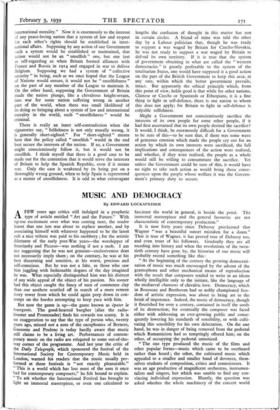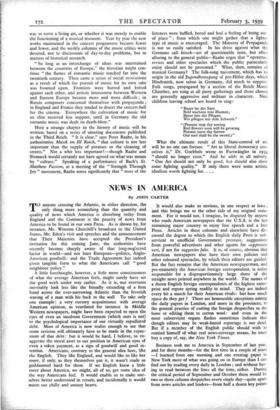MUSIC AND DEMOCRACY
By EDWARD LOCKSPEISER
AFEW years ago critics still indulged in a prophetic type of article entitled " Art and the Future." With tip-toe excitement over what was coming next, the reader learnt that one ism was about to replace another, and by associating himself with whatever happened to be the latest cult a nice tribute was paid to his snobbery ; for the artistic dilettante of the early post-War years—the worshipper of Stravinsky and Picasso—was nothing if not a snob. I am not suggesting that he was not genuine—exclusiveness does not necessarily imply sham ; on the contrary, he was at his best discerning and sensitive, at his worst, precious and self-conscious. But he was not a fake, as those who saw him juggling with fashionable slogans of the day imagined he was. What especially distinguished him was his distrust of any wide appeal of the object of his passion. No sooner had this object caught the fancy of men of commoner clay than our aesthete scuttled off in search of a more remote ivory tower from which he could again peep down in con- tempt on the hordes attempting to keep pace with him.
But now the game is up—the game known as Outer le bourgeois. The good-hearted burgher (alias the radio- listener and Promenader) finds his rewards too scanty. It is no exaggeration to say that the type of person who, twenty years ago, missed not a note of the cacophonies of Berners, Goossens and Poulenc is today hardly aware that music still claims to be a living art. Performances of contem- porary music on the radio are relegated to some out-of-the- way corner of the programme. And last year the critic of the Daily Telegraph, which sponsored the festival of the International Society for Contemporary Music held in London, warned his readers that the music usually per- formed at these festivals is " not exactly pleasurable." " This is a world which has lost most of the uses it once had for contemporary composers," he felt bound to explain. " To ask whether the International Festival has brought to light an immortal masterpiece, or even one calculated to fascinate the world in general, is beside the point. The immortal masterpiece and the general favourite are not characteristic of contemporary production."
It is now forty years since Debussy proclaimed that Wagner " was a beautiful sunset mistaken for a dawn." That is true of Wagner, it has proved true of Debussy too, and even truer of his followers. Gradually they are all receding into history and when the revolutions of the twen- tieth century have gone by, the historian of our music will probably record something like this: " At the beginning of the century the growing democrati- sation of music was much encouraged by the advent of the gramophone and other mechanical means of reproduction with the result that composers tended to write in an idiom wholly intelligible only to the initiate, like the language of the mediaeval chansons of chivalric love. Democracy, which in Rousseau and Beethoven had so nobly championed free- dom of artistic expression, was about to bring art to the brink of impotence. Indeed, the music of democracy, though it flourished for over a century, contained in itself the seeds of its destruction; for eventually the composer was faced either with addressing an ever-growing public and conse- quently lowering his standards of sensibility, or with culti- vating this sensibility for his own delectation. On the one hand, he was in danger of being removed from the pedestal which Romanticism had so temptingly offered him; on the other, of occupying the pedestal unnoticed.
" The one type produced the music of the films and other popular forms—music which came to be overheard rather than heard ; the other, the cultivated music which appealed to a smaller and smaller band of devotees, them- selves students of composition, critics and connoisseurs. It was an age productive of magnificent orchestras, instrumen- talists and singers, but which was unable to fmd any con- vincing individual expression. Bluntly, the question was asked whether the whole machinery of the concert world was to serve a living art, or whether it was merely to enable the functioning of a musical museum. Year by year the new works maintained in the concert programme became fewer and fewer, and the weekly columns of the music critics were devoted, not to discussions of day-to-day problems, but to matters of historical research.
" So long as an interchange of ideas was maintained between the countries of Europe," the historian might con- tinue " the flames of romantic music reached far into the twentieth century. Then came a series of social revolutions as a result of which the pursuit of music for its own sake was frowned upon. Frontiers were barred and bolted against each other, and artistic intercourse between Western and Eastern Europe became more and more difficult ; in Russia composers concerned themselves with propaganda ; in England and France they tended to desert the concert-hall for the cinema. Everywhere the cultivation of music for an elite received less support, until in Germany the old romantic music was dealt its death-blow."
Here a strange chapter in the history of music will be written, based on a series of amazing documents published in the Third Reich. " It is clear," says Peter Raabe, in his authoritative Musik im III Reich, " that culture is not less important than the supply of potatoes or the cleaning of streets." Not a whit less important !—though Raabe and Bismarck would certainly not have agreed on what was meant by " culture." Speaking of a performance of Bach's St. Matthew Passion, at a meeting of the " Strength Through Joy " movement, Raabe notes significantly that " most of the listeners were baffled, bored and had a feeling of being out of place " ; from which one might gather that a lighter type of music is encouraged. The Ministry of Propaganda is not so easily satisfied. In his drive against what the Germans call kitsch—art of questionable taste, but often alluring to the general public—Raabe urges that " operettas, revues and other spectacles which the public particularly enjoy should not be presented." What, then, remains of musical Germany? The folk-song movement, which has its origin in the old 7ugendbewegung of pre-Hitler days, which Hindemith, now taboo in Germany, did much to support. Folk songs, propagated by a section of the Reich Music Chamber, are sung at all party gatherings and those chosen are generally aggressive and militant in character. Nazi children leaving school are heard to sing:
"Bauer las das Saen Bald wachsen rote Blumen; Bauer lass das Pflugen Wir pfliigen mit dem Schwert."
"(Peasant stop thy sowing Red flowers soon will be growing Peasant leave thy furrow Our tool shall be the sword.)"
What the ultimate result of this State-control of art will be no one can foresee. " Art as liberal democracy con- ceives it," Dr. Goebbels wrote to Furtwangler in 1934 " should no longer exist." And he adds in all naivety, " Our Art should not only be good, but should also show some fighting quality." If only there were some artistic idealism worth fighting for. . . .











































 Previous page
Previous page